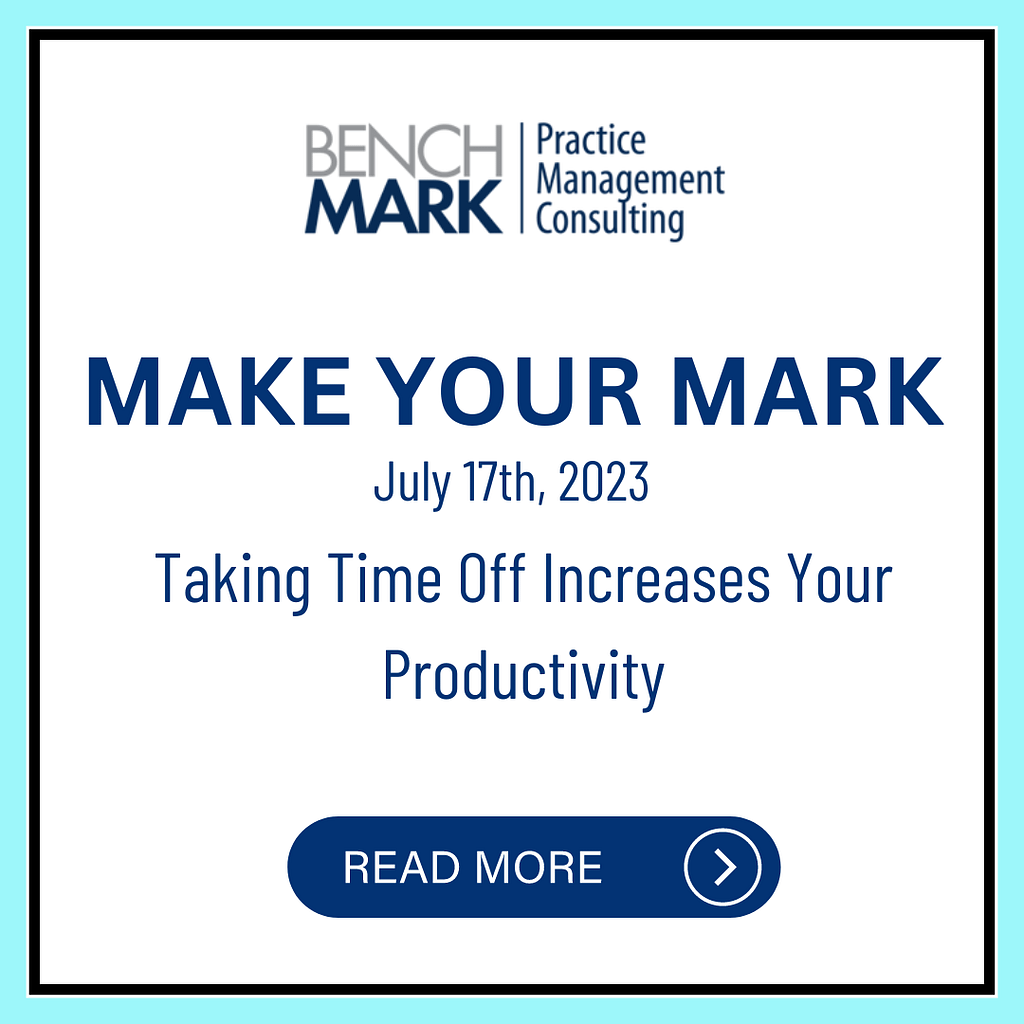In the midst of the pandemic, many individuals found themselves reevaluating the importance of taking time off from work. It became common to question the necessity of vacations when travel and leisure opportunities were restricted. Understandably, there was a collective desire to minimize time off and focus on catching up financially, rebuilding (in some cases) patient base, and reevaluating how to be effective in the office.
However, it is crucial to consider the potential costs of working without taking a break.
The absence of vacation time can lead to burnout and diminished productivity. Continuous work without adequate rest and rejuvenation can take a toll on mental and physical well-being, affecting the overall quality of work. Sustained stress levels can result in decreased motivation, creativity, and efficiency, ultimately hindering professional growth and satisfaction. Even for those of us who love what we do and can (with just cause) justify the importance of not taking time away, let’s consider three vitally important costs when we don’t take that time off.
The first cost is obvious, dentistry is a very physical profession where your day is spent in contorted positions for long periods of time, often without a break. Your body can easily become sore and if we don’t maintain awareness it can lead to chronic problems, if it isn’t already. Ensure that you are regularly exercising and making movements that counterbalance the daily strain on your body. Seek the help of a professional to keep your back, shoulders and neck in prime condition.
One reason our bodies crave a vacation is that it’s needed. Our body is asking us to take that break. What we often find is that those aches and pains either melt away completely or at least subside when we move away from the chair for a week or so.
The second cost of not taking a vacation is your stress level. The daily grind can wreak havoc on our systems (and we know this to be true). One of the biggest stress reactions busy people have is stress eating. And we know that stress eating isn’t typically carrots and peanut butter, it is chocolate, alcohol, and candy, all things that we suggest our patients avoid, or at least use sparingly.
The benefits of vacations extend beyond stress reduction and relaxation. Time away from work allows individuals to disconnect from their daily responsibilities and gain a fresh perspective. It provides an opportunity to reflect, recharge, and engage in activities that bring joy and fulfillment. By stepping away from the routine, you can gain new insights, spark creativity, and return to your practice with renewed energy and enthusiasm. We become more approachable and relaxed after a vacation.
The third cost of not taking a vacation is the expenditure on your relationships. If your body is sore and your stress level hasn’t been managed well, you may not realize how badly you need that time off. You may think that you are doing fine but if you asked your staff for feedback, they may give you a different story.
Moreover, vacations foster work-life balance, an essential aspect of overall happiness and contentment. It allows individuals to devote time to personal relationships, hobbies, and self-care, which in turn positively impact mental health and overall well-being. Neglecting these areas can lead to feelings of dissatisfaction and a sense of imbalance in life. As busy professionals we tend to sacrifice our families on the ‘work alter’ believing that they will “always be here” yet we know that is not the case. Taking time with your family, especially away from the daily grind will ensure they know they remain a priority.
Ultimately, a change in your routine will help you enjoy a fresh perspective.
When you return to the office check what your production per hour was when you had a patient in the chair (this excludes any open time) prior to your time off and then measure it for the week after you return, I can almost promise you that you will see a positive change in the outcome. Time away from the office will improve your physical self and your mental self along with your production. Who could ask for a better ROI (Return on Investment) from a decision you have made?
While the decision to forgo vacations during the pandemic was understandable, as we navigate the post-pandemic landscape in July 2023, it is crucial to reassess our approach. Finding a balance between work and leisure, is important for long-term success and happiness. By acknowledging the potential costs of working without vacation time and prioritizing self-care, a dental professional can enhance their professional performance, personal well-being, and overall quality of life.




